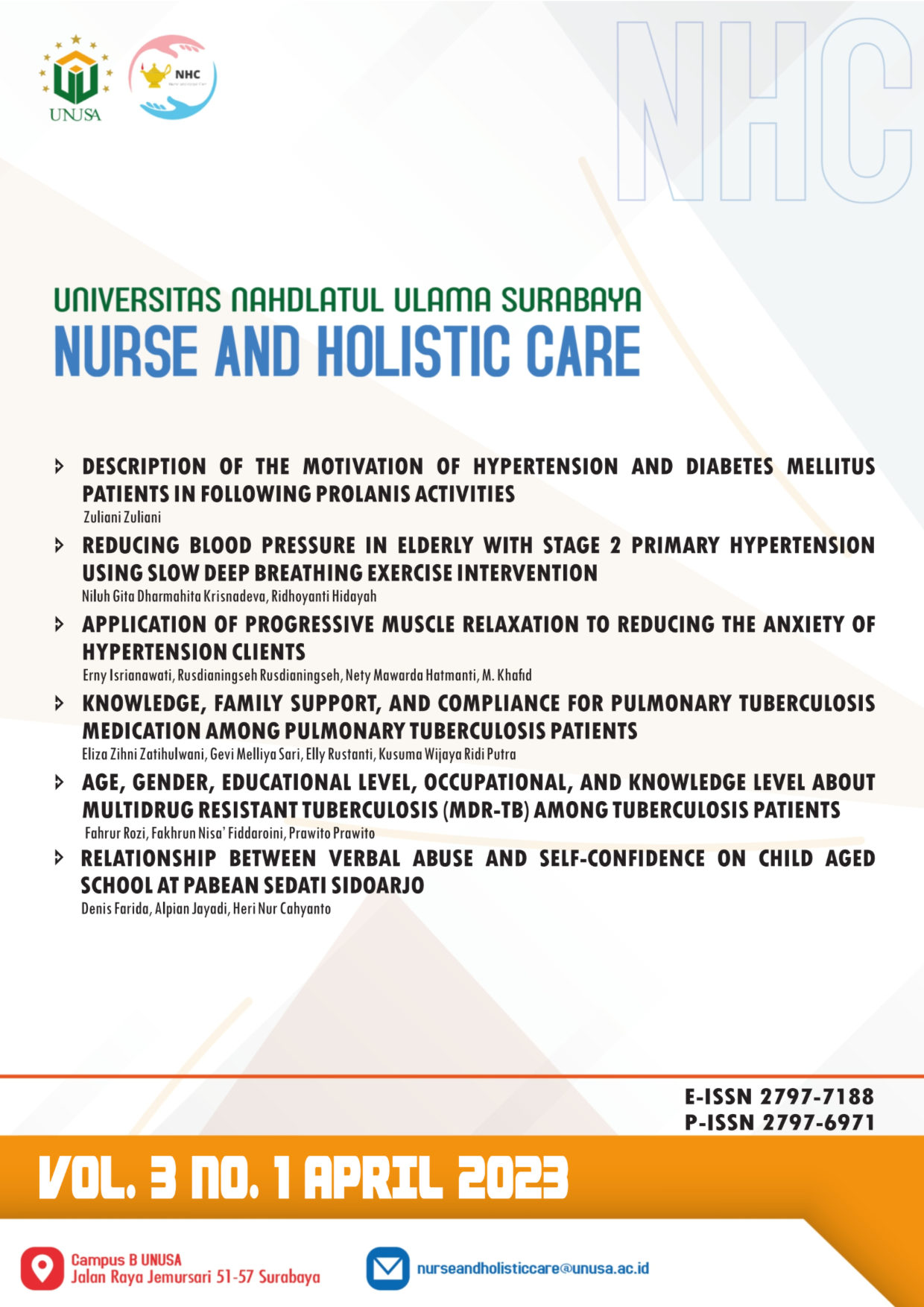AGE, GENDER, EDUCATIONAL LEVEL, OCCUPATIONAL, AND KNOWLEDGE LEVEL ABOUT MULTIDRUG RESISTANT TUBERCULOSIS (MDR-TB) AMONG TUBERCULOSIS PATIENTS
##plugins.themes.bootstrap3.article.main##
Abstract
Background: Resistance of Mycobacterium Tuberculosis is a condition in which Anti-Tuberculosis (OAT) drugs are unable to kill the Mycobacterium Tuberculosis germs. One type of resistance is Multidrug Resistant Tuberculosis. Multidrug Resistant Tuberculosis (MDR-TB) is TB caused by TB bacteria that are resistant to 2 types of OAT, namely INH and Rifampin. The consequences if resistance to OAT are deterioration of health, increased costs, prolonged treatment, high rates of therapy failure and death.
Objective: This study aimed to determine relationship between age, gender, educational level, occupational, and knowledge level about multidrug resistant tuberculosis (MDR-TB) among tuberculosis patients at the Kanigaran Public Health Center, Probolinggo City.
Methods: This study used a cross sectional research design with a sample of 60 respondents with pulmonary TB undergoing treatment at the Kanigaran Public Health Center, Probolinggo City. Data was collected using a questionnaire with an ordinal scale which was then analyzed using the Spearman Rank statistical test.
Result: Based on the research results, it was found that only age and educational level had a relationship with knowledge level (r = -.291, p = .024; r = .470, p = .000; respectively).
Conclusion: The level of knowledge of TB patients about multidrug-resistant TB (MDR-TB) can be influenced by education level and age, so that health workers can provide an understanding related to MDR-TB according to the level of education and age of the TB patient.
Downloads
##plugins.themes.bootstrap3.article.details##
Copyright (c) 2023 Fahrur Rozi, Fakhrun Nisa’ Fiddaroini, Prawito Prawito

This work is licensed under a Creative Commons Attribution-NonCommercial 4.0 International License.
Authors who publish with Nurse and Holistic Care agree to the following terms:
- Authors retain copyright licensed under a Creative Commons Attribution-NonCommercial 4.0 (CC BY-NC 4.0), which allows others to remix, tweak, and build upon the authors' work non-commercially, and although the others' new works must also acknowledge the authors and be non-commercial, they don't have to license their derivative works on the same terms.
- Authors are permitted and encouraged to post their work online (e.g., in institutional repositories or on their website) prior to and during the submission process, as it can lead to productive exchanges, as well as earlier and greater citation of published work (See The Effect of Open Access). Authors can archive pre-print and post-print or publisher's version/PDF.
References
Budiman. (2014). Metode Penelitian Kesehatan. Jakarta: Salemba Medika.
Devi, A. U. (2019). Faktor-faktor yang Berhubungan Dengan Perilaku Pasien TB MDR dalam Pencegahan Penularan TB MDR di Wilayah Kerja Puskesmas Kota Semarang. Jurnal Kesehatan Masyarakat, 7(1).
Dinas Kesehatan Kabupaten Probolinggo. (2018). Profil Kesehatan Kabupaten Probolinggo Tahun 2017. Dinas Kesehatan Kabupaten Probolinggo.
Fauji, A. (2010). Faktor-faktor yang berhubungan dengan Perilaku Ibu dalam Pemanfaatan Layanan Imunisasi di Desa Beberan Kecamatan Ciruas Banten. Jakarta: UIN Syarif Hidayatullah.
Indriyani. (2012). Gambaran dan Faktor yang Berhubungan dengan Partisipasi VCT (Voluntary Counseling and Testing HIV) pada Warga Binaan Pemasyarakatan 57 di Rumah Tahanan Negara Kelas IIA Pondok Bambu Tahun 2012. Fakultas Kesehatan Masyarakat, Universitas Indonesia.
Kementerian Kesehatan Republik Indonesia. (2014). Strategi Nasional Pengendalian TB di Indonesia.
Kementerian Kesehatan Republik Indonesia. (2016). Peraturan Mentri Kesehatan Republik Indonesia No. 67 Tahun 2016 Tentang Penanggulangan Tuberkulosis. Kementerian Kesehatan Republik Indonesia.
Kuan, & et al. (2014). Factors contributing to Breastfeeding Success. American Academy of Pediatrics Journal, 104.
Linda, D. O. (2012). Hubungan Karakteristik Klien Tuberkulosis dengan Pengetahuan tentang Multidrugs Resisten Tuberkulosis (MDR TB) di Poli Paru Puskesmas Kecamatan Jagakarsa. Fakultas Ilmu Keperawatan, Universitas Indonesia.
Munawwarah, R., & Dkk. (2013). Gambaran Faktor Risiko Pengobatan Pasien Tb-Mdr Rs Labuang Baji Kota Makassar Tahun 2013. Jurnal Epidemiologi.
Nurbiah. (2017). Gambaran Faktor Risiko Pengobatan Pasien Multidrug Resistance Tuberculosis (MDR-TB) Di Rsud Labuang Baji Kota Makassar Tahun 2017. UIN Alauddin Makassar.
Nurhayati, I. (2015). Perilaku Pencegahan Penularan dan Faktor-Faktor yang Melatar belakanginya. DOI: https://doi.org/10.24198/jkp.v3i3.118
Putra, K. W. R., & Toonsiri, C. (2019). Factors related to the successful treatment of tuberculosis: A literature review. Belitung Nursing Journal, 5(4), 136–146. https://doi.org/10.33546/bnj.749 DOI: https://doi.org/10.33546/bnj.749
Saptari, A. F., & Sudiarti, T. (2013). Hubungan Sikap dan Pengetahuan dengan Niat Mendukung Praktik Pemberian ASI Eksklusif pada Mahasiswa Magister Pria Universitas Indonesia Tahun 2013. Fakultas Kesehatan Masyarakat, Universitas Indonesia.
Wiliyanarti, P. F., Putra, K. W. R., & Annisa, F. (2020). The Effect of Health Education with TB Card on the Prevention of Pulmonary TB Transmission Behavior. Jurnal Keperawatan, 11(2), 152–160. https://doi.org/https://doi.org/10.22219/jk.v11i2.7711 DOI: https://doi.org/10.22219/jk.v11i2.7711
Yuni, I. D. A. M. A. (2016). Relationship Between TB Treatment Phase and Knowledge of MDR TB with TB Patient’s Compliance. Fakultas Kesehatan Masyarakat, Universitas Airlangga, Surabaya. DOI: https://doi.org/10.20473/jbe.v4i3.2016.301-312

